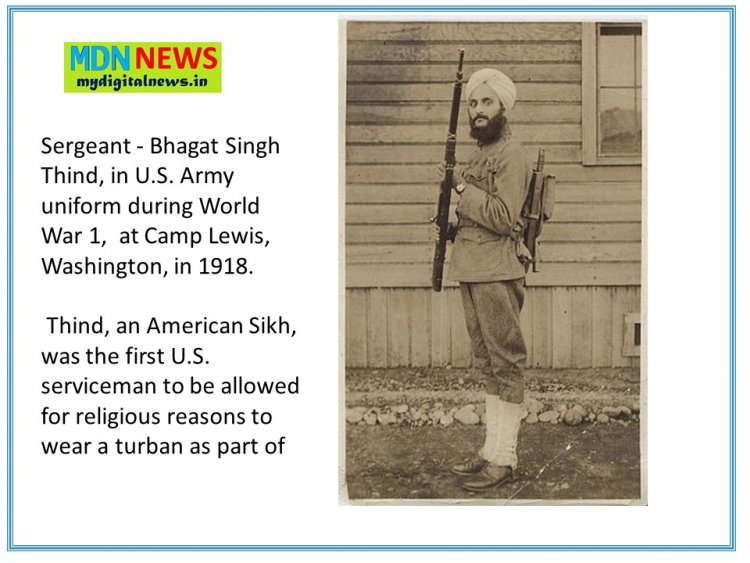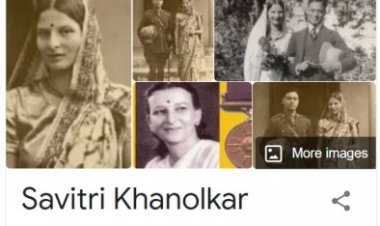Forgotten Facts about & the Death of Bhagat Singh Thind From the Era of World war 1
Bhagat Singh Thind was an Indian American writer and lecturer on spirituality who served in the United States Army during World War I and was involved in a Supreme Court case over the right of Indian people to obtain United States citizenship. Bhagat Singh Thind enlisted in the United States Army a few months before the end of World War I. After the war he sought to become a naturalized citizen, following a legal ruling that Caucasians had access to such rights

Bhagat Singh Thind, during his early life, was influenced by the spiritual teachings of his father whose "living example left an indelible blueprint." After graduating from Khalsa College, he left for Manila, where he stayed for a year.
Bhagat Singh Thind was an Indian American writer and lecturer on spirituality who served in the United States Army during World War I and was involved in a Supreme Court case over the right of Indian people to obtain United States citizenship.
Bhagat Singh Thind enlisted in the United States Army a few months before the end of World War I. After the war he sought to become a naturalized citizen, following a legal ruling that Caucasians had access to such rights .
In 1923, the Supreme Court ruled against him in the case the United States v. Bhagat Singh Thind, which retroactively denied all Indian Americans the right to obtain United States citizenship for failing to meet the definition of a "white person", "person of African descent", or "alien of African nativity".
Bhagat Singh Thind remained in the United States, earned his PhD in theology and English literature at UC Berkeley, and delivered lectures on metaphysics. Bhagat Singh Thind's lectures were based on Sikh religious philosophy but included references to the scriptures of other world religions and the works of Ralph Waldo Emerson, Walt Whitman, and Henry David Thoreau. Bhagat Singh Thind also campaigned for Indian independence from colonial rule.
In 1936, Bhagat Singh Thind applied successfully for United States citizenship through the State of New York.
Bhagat Singh Thind was born on October 3, 1892, in the village of Taragarh Talawa of Amritsar district in the state of Punjab in India, listed as number 68 in this record. He belonged to the Thind clan of Kamboj. In 2020 the story of his Supreme Court case was part of PBS’s documentary Asian Americans.
Bhagat Singh Thind Arrival in the United States
Bhagat Singh Thind arrived in the United States in 1913 to pursue higher education at an American university. On July 22, 1918, Bhagat Singh Thind was recruited by the United States Army to fight in World War I, and on November 8, 1918, Bhagat Singh Thind was promoted to the rank of Acting Sergeant. He received an honorable discharge on December 16, 1918, with his character designated as "excellent".
U.S. citizenship conferred many rights and privileges, but only "free white men" and "persons of African nativity or persons of African descent" could be naturalized. In the United States at this time, many anthropologists used the term Caucasian as a synonym for white. Indians were also categorized as Caucasians by various anthropologists.
Thus, several Indians were granted United States citizenship in different U.S. states. Thind also applied for citizenship from the State of Washington in July 1918. First United States citizenship of Bhagat Singh Thind
Bhagat Singh Thind with his battalion at Camp Lewis, Washington on November 18, 1918. Bhagat Singh Thind received his certificate of US citizenship on December 9, 1918, wearing military uniform as he was still serving in the United States Army. However, the Bureau of Naturalization did not agree with the decision of the district court to grant Bhagat Singh Thind citizenship.
Bhagat Singh Thind's nationality was referred to as "Hindoo" or "Hindu" in all legal documents and in the news media despite being a practicing Sikh. At that time, Indians in the United States and Canada were called Hindus regardless of their religion. Bhagat Singh Thind's citizenship was revoked four days later, on December 13, 1918, on the grounds that Thind was not a "white man".
Second United States citizenship of Bhagat Singh Thind
Bhagat Singh Thind applied for United States citizenship again from the neighbouring State of Oregon, on May 6, 1919. The same Bureau of Naturalization official who revoked Bhagat Singh Thind’s citizenship tried to convince the judge to refuse citizenship to Bhagat Singh Thind, accusing Thind of involvement in the Ghadar Party, which campaigned for Indian independence from colonial rule.
Judge Charles E. Wolverton wrote that Bhagat Singh Thind "stoutly denies that he was in any way connected with the alleged propaganda of the Gadar Press to violate the neutrality laws of this country, or that he was in sympathy with such a course.
Bhagat Singh Thind frankly admits, nevertheless, that he is an advocate of the principle of India for the Indians, and would like to see India rid of British rule, but not that he favors an armed revolution for the accomplishment of this purpose." The judge took all arguments and Bhagat Singh Thind’s military record into consideration and declined to agree with the Bureau of Naturalization. Thus, Thind received United States citizenship for the second time on November 18, 1920.
Supreme Court appeal - Bhagat Singh Thind
The Bureau of Naturalization appealed against the judge’s decision to the next higher court, the Ninth Circuit Court of Appeals, which sent the case to the Supreme Court for ruling on the following two questions:
"Is a high caste Hindu of full Indian blood, born at Amritsar, Punjab, India, a white person within the meaning of section 2169, Revised Statutes?" "Does the act of February 5, 1917 (39 Stat. L. 875, section 3) disqualify from naturalization as citizens those Hindus, now barred by that act, who had lawfully entered the United States prior to the passage of said act?"
Section 2169, Revised Statutes, provides that the provisions of the Naturalization Act "shall apply to aliens, being free white persons, and to aliens of African nativity and to persons of African descent."
In preparing briefs for the Ninth Circuit Court, Bhagat Singh Thind's attorney, Sakharam Ganesh Pandit, argued that the Immigration Act of 1917 barred new immigrants from India but did not deny citizenship to Indians who, like Bhagat Singh Thind, were legally admitted before the passage of the new law. The purpose of the Immigration Act was "prospective, and not retroactive."
On February 19, 1923, Justice George Sutherland delivered the unanimous opinion of the Supreme Court to deny citizenship to Indians, stating that "a negative answer must be given to the first question, which disposes of the case and renders an answer to the second question unnecessary, and it will be so certified." The justices wrote that since the "common man's" definition of "white" did not include Indians, they could not be naturalized.
Bhagat Singh Thind's citizenship was revoked and the Bureau of Naturalization issued a certificate in 1926 cancelling his citizenship a second time. The Bureau of Naturalization also initiated proceedings to revoke citizenship granted to other Indian Americans. Between 1923 and 1926, the citizenship of fifty Indians was taken away.
Bhagat Singh Thind and final United States citizenship
Bhagat Singh Thind petitioned for naturalization a third time through the state of New York in 1935 after the Congress passed the Nye-Lea Act, which made World War I veterans eligible for naturalization regardless of race. Based on his status as a veteran of the United States military during World War I, he was finally granted United States citizenship nearly two decades after he first petitioned for naturalization.
Bhagat Singh Thind-Contributions
- Bhagat Singh Thind Fought for United States citizenship (the United States v. Bhagat Singh Thind).
- Bhagat Singh Thind First turbaned soldier in the United States Army
- Bhagat Singh Thind Indian independence activist and General Secretary of Ghadar Party from 1916–1917.
- Bhagat Singh Thind Sikh spiritual writer and philosopher.
Bhagat Singh Thind learned about American culture from students and teachers at the University of California, Berkeley, and from working people in the lumber mills of Oregon and Washington, where he worked during summer vacations to support himself financially.
Bhagat Singh Thind's teachings incorporated the scriptures of many religions, including Sikhism. During his lectures to Christian audiences, Bhagat Singh Thind frequently quoted the Vedas, Guru Nanak, Kabir, and other sources in Indian philosophy.
Bhagat Singh Thind also made reference to the works of Ralph Waldo Emerson, Walt Whitman, and Henry David Thoreau. Bhagat Singh Thind earned a PhD, became a writer, and was respected as a spiritual guide. He gave a new "vista of awareness" to his students throughout the United States and was able to initiate "thousands of disciples" into his expanded view of reality – "the Inner Life, and the discovery of the power of the Holy Nãm."
Bhagat Singh Thind published many pamphlets and books, including Radiant Road to Reality, Science of Union with God, The Pearl of Greatest Price, House of Happiness, Jesus, The Christ: In the Light of Spiritual Science (Vol. I, II, III), The Enlightened Life, Tested Universal Science of Individual Meditation in Sikh Religion, and Divine Wisdom.
Death of Bhagat Singh Thind
Thind was writing a book when he died on September 15, 1967. He was outlived by his wife, Vivian, whom he had married in March 1940, and his daughter Tara and son David. His son created a website to propagate the philosophy for which his father devoted himself to the United States. He also posthumously published two of his father's books: Troubled Mind in a Torturing World and their Conquest and Winners and Whiners in this Whirling World.
Writings of Bhagat Singh Thind
- Radiant Road to Reality
- Science of Union with God
- The Pearl of Greatest Price
- House of Happiness
- Jesus, The Christ: In the Light of Spiritual Science (Vol. I, II, III)
- The Enlightened Life
- Tested Universal Science of Individual Meditation in Sikh Religion
- Divine Wisdom (Vol. I, II, III)
- Posthumously released
- Troubled Mind in a Torturing World and their Conquest
- Winners and Whiners in this Whirling World
Note: please Comment Here for UPDATES and CORRECTIONS
Donate. Buy Us Coffee
Why news media is in crisis & How you can fix it.
India needs free, fair, non-hyphenated and questioning journalism even more as it faces multiple crises. But the news media is in a crisis of its own. There have been brutal layoffs and pay cuts. The best of journalism is shrinking, yielding to the crude prime-time spectacle. My digital news .in has very few young reporters, columnists and editors working for it. Sustaining journalism of this quality needs smart and thinking people like you to pay for it. Whether you live in India or overseas, you can do it here
Donate. https://mydigitalnews.in/donate
NOTE: Please email us for updates and corrections, if you wish to publish articles like this you can send them to info@mydigitalnews.in or mydigitalnews.in@gmail.com or you can Directicle write Articles on our Site by registering https://mydigitalnews.in/register
Disclaimer: Mydigitalnews.in provides the content from various information sources ‘as is and the content to be used only for informational purposes and not responsible for the inaccuracy or deficiency of the provided information. Mydigitalnews. in have the right, at its sole discretion, to make modifications in any aspect of the provided information.
Mydigitalnews. in Internet site may contain links to other Internet sites. While we try to link only to sites that share our high standards and respect for privacy, we are not responsible for the content or the privacy practices employed by other sites.
What's Your Reaction?











































































